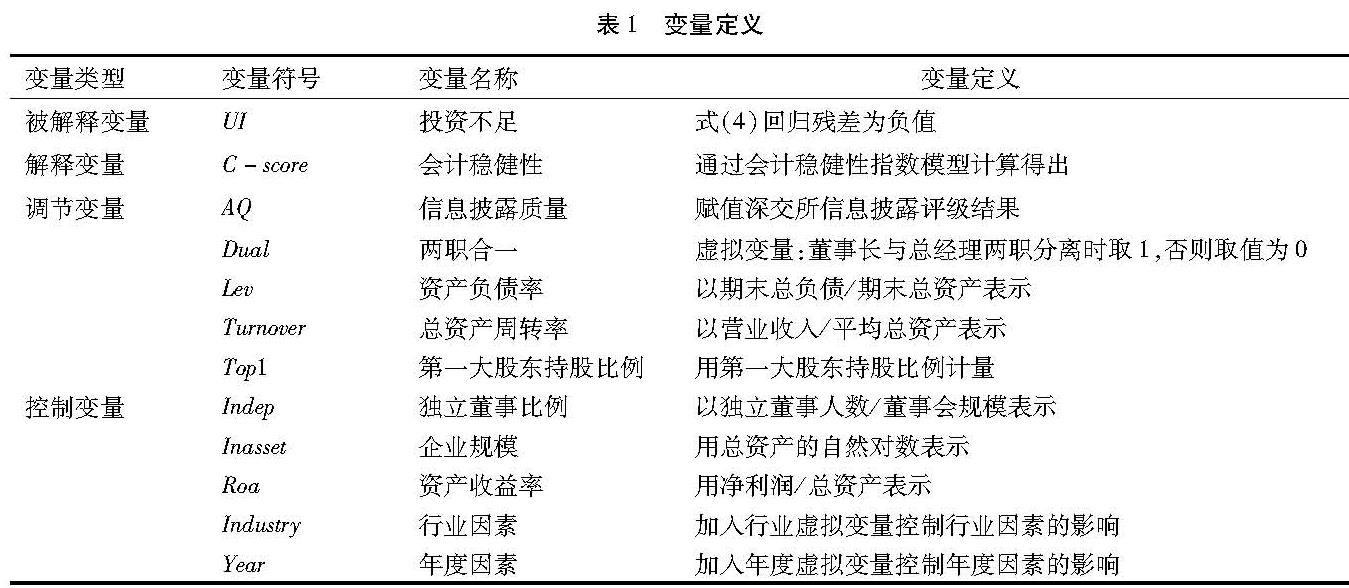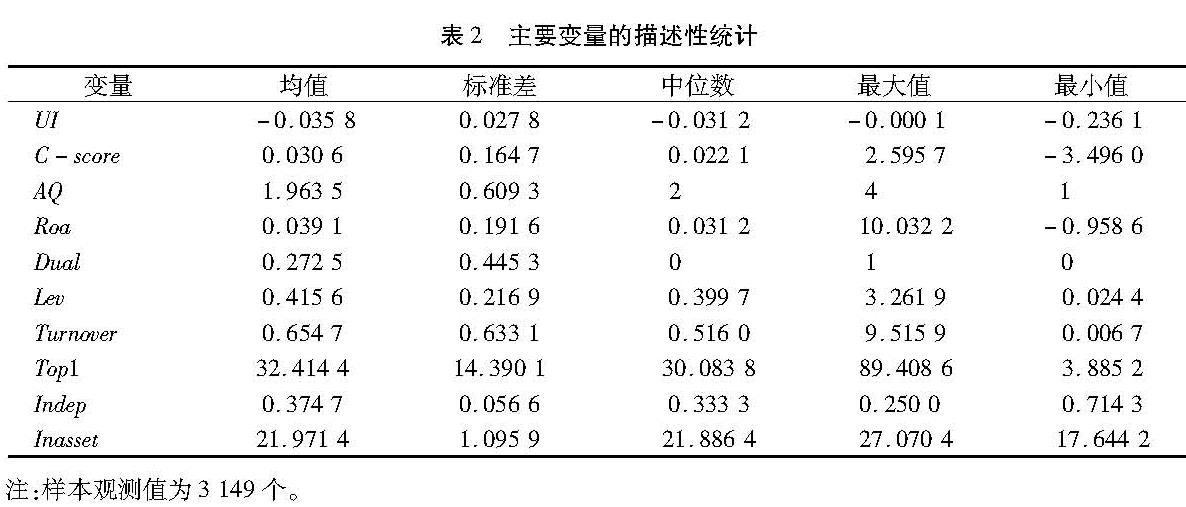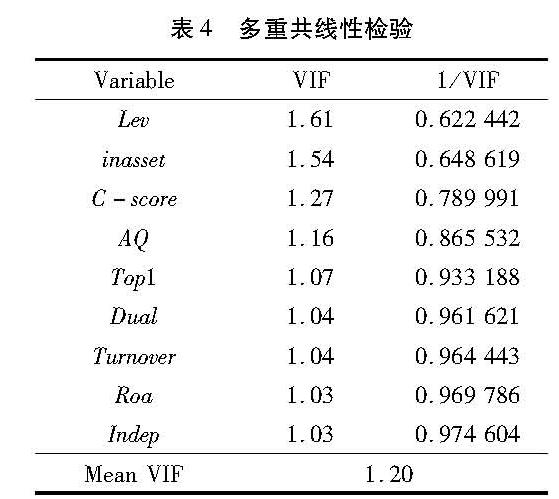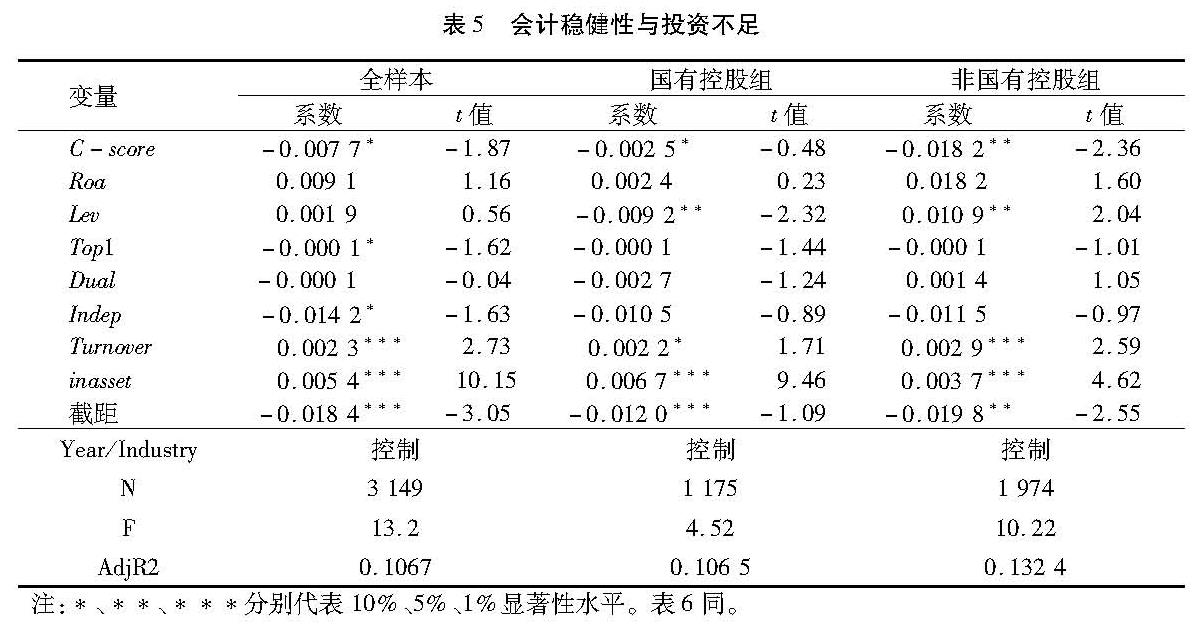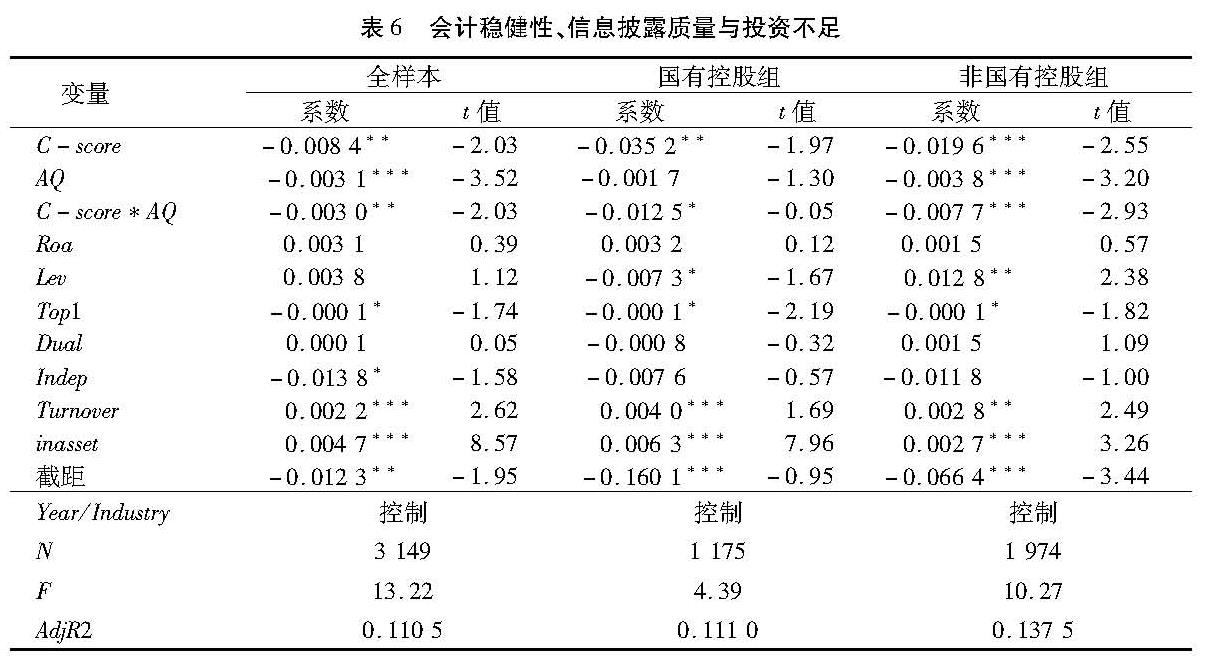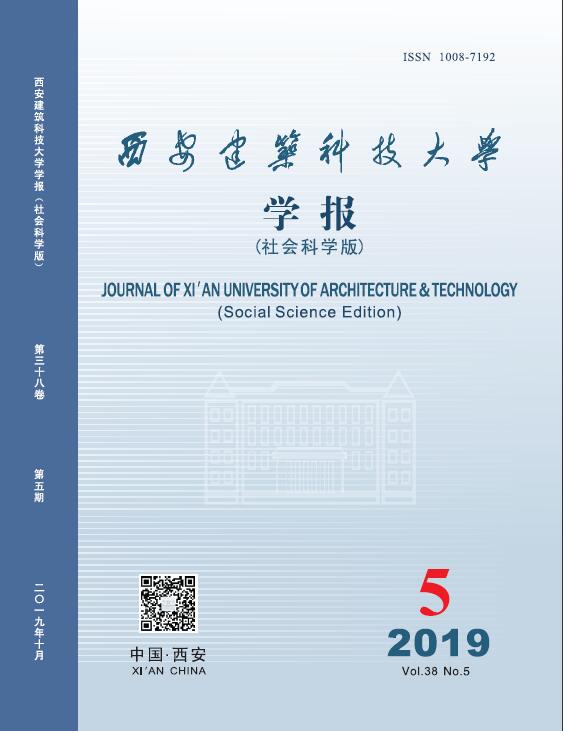作者简介:胡妙迪(1995-),女,安徽农业大学经济管理学院硕士研究生,研究方向为会计理论与方法; 邹能锋(1965-),男,安徽农业大学经济管理学院副教授,研究方向为会计理论与方法。E-mail:1824729619@qq.com
(安徽农业大学 经济管理学院,安徽 合肥 230036)
(College of Economics and Management, Anhui Agricultural University, Hefei 230036,China)
accounting conservatism; information disclosure quality; underinvestment; state-owned enterprises; non-state-owned enterprises
DOI: 10.15986/j.1008-7192.2019.05.013
备注
作者简介:胡妙迪(1995-),女,安徽农业大学经济管理学院硕士研究生,研究方向为会计理论与方法; 邹能锋(1965-),男,安徽农业大学经济管理学院副教授,研究方向为会计理论与方法。E-mail:1824729619@qq.com
选取2013—2017年我国A股上市公司为研究样本,在Basu构建的会计稳健性模型和Richardson构建的投资效率模型基础上,从信息披露质量的视角,实证检验了会计稳健性对企业投资不足的影响。结果 表明,会计稳健性能够有效地抑制企业的投资不足现象; 研究进一步地将投资不足样本按企业产权属性分为国有企业组和非国有企业组,并将两组进行比较分析,发现在非国有企业组中会计稳健性对投资不足的抑制效果更为显著; 同时在加入信息披露质量这一调节变量后,会计稳健性对投资不足的抑制作用得到加强,可以得出会计稳健性与信息披露质量两者在对投资不足的抑制作用上存在着互补关系。
Based on Basu model of accounting conservatism and Richardson model of investment efficiency the paper takes Chinese A-share listed companies over the period of 2013 to 2017 as samples and empirically tests the effects of accounting conservatism on the underinvestment of enterprises from the perspective of information disclosure quality. The findings indicate that accounting conservatism can effectively restrain the phenomenon of underinvestment. By comparing the underinvestment samples which are divided into state-owned group and non-state-owned group, the paper finds that accounting conservatism has a more obvious restraining effect on the underinvestment in non-state-owned group, and the effect has been strengthened when adding information disclosure quality as the regulate variable. Therefore, there is a complementary relationship between accounting conservatism and information disclosure quality in restraining the underinvestment.
引言
投资是指企业进行以盈利为目的的资本性支出活动。现有研究表明,我国上市公司普遍存在着非效率投资现象。主要有两方面的原因:一是客观原因。在实际资本市场中,信息不对称、自由现金流量和委托代理问题是常见的。这些问题导致企业进行投资时偏离最优投资抉择和非效率投资问题的产生。二是主观原因。管理者的个人效用与会计利润紧密相关,他们会比较自己在投资项目中要付出的成本和获得的收益,如果他们觉得放弃净现值为正或接受净现值为负的项目的收益要大于成本,就会出现投资不足或过度投资。
会计稳健性是一项重要的会计基本原则,又被称为会计谨慎性,这要求会计工作人员在从事工作时不得多估资产和收益,低估负债和损失。Basu[1]提出会计稳健性是指会计盈余对坏消息(损失)的反应速度要比好消息(收益)快,对资产和收入的确认标准也更高。
信息披露是指企业直接或间接影响用户决策的重要会计信息以公开报告的形式提供给信息用户。信息披露质量的关键在于披露是否真实可靠,披露是否充分及时,披露的对象是否公平。信息披露是由于所有权与经营权和代理权分离的问题而产生的。
在会计稳健性和信息披露质量对投资不足所起的作用上,国内外学者得出的研究结论不尽相同。同时相关数据表明我国上市公司存在不同程度的稳健性和信息披露质量水平,而对其产生的经济后果并不明确,这为本文的研究提供了契机。本研究为企业提高会计稳健性治理以及加强信息披露质量提供了依据,同时为解决我国普遍存在的非效率投资行为提供了一定的参考。
1 文献回顾和研究假设的提出
1.1 会计稳健性与投资不足从会计稳健性与投资不足的相关文献来看,主要存在以下两种观点:一是会计稳健性能够改善公司治理,能减少投资与自由现金流的敏感度[2],通过缓解融资约束[3-4]; 通过缓解管理者与股东之间的代理冲突、降低投资者面临的信息不对称[5],从而能够抑制企业的投资不足。二是会计稳健性会加剧企业的投资不足[6],使得企业的投资不足状况恶化,加重企业的非效率投资程度[7]。
综上所述,国内外对于会计稳健性对投资不足的影响研究所得到的结论有所差异。笔者认为会计稳健性能够有效地抑制企业的投资不足行为,由此提出本文的第一个假设:
假设一:在其他条件相同的情况下,会计稳健性与投资不足之间负相关。
1.2 国有和非国有上市公司朱永明、李玲玲[8]指出在我国特殊的制度环境下,相比于国有企业,非国有企业更容易出现融资困难,更有可能出现投资不足。徐全华[2]研究发现在非国有控股公司,稳健性主要是发挥抑制过度投资的作用,对投资不足的抑制作用不显著。
综上所述,在国有和非国有企业中,会计稳健性对投资不足的作用也有一定的差异性。笔者认为相比于国有企业,非国有企业融资较为困难,更容易出现投资不足,则会计稳健性的抑制作用更为显著。由此提出本文的第二个研究假设:
假设二:在非国有上市公司中,会计稳健性对投资不足的抑制作用更为显著。
1.3 会计稳健性、信息披露质量与投资不足李青原、罗婉[9]基于财务报表附注的信息披露的研究发现报表重述公告后公司的投资效率显著提高。窦炜等[10]发现高质量的会计信息和审计监督确实有助于缓解我国上市公司低下的资本配置效率。刘婉立、张苗[11]高质量会计信息的充分披露,能够抑制经理人因单方面占有较多信息,从而抑制管理者的非效率投资行为。
笔者认为,高会计信息披露质量能够提高投资者对公司估计的精确度,降低信息风险和投资者的估计偏误,通过完善合同和监督,提高上市公司的投资效率,减少逆向选择和道德风险。由此提出本文的第三个研究假设:
假设三:在其他条件相同的情况下,信息披露质量越高,会计稳健性对投资不足的抑制作用就越大,两者存在互补关系。
2 实验研究设计
2.1 样本选择和数据来源本文选取 2013—2017 年我国沪深A 股上市公司的相关财务数据作为研究样本,同时剔除金融和保险行业样本、ST和*ST 公司样本、年度首次发行新股以及数据缺失的公司。为了避免极端值的影响,我们对连续变量进行了上下1%的缩尾处理,最后得到总年度观测值3 149个,其中国有上市公司1 175个,非国有上市公司1 974个。本文中投资效率模型、会计稳健性模型以及控制变量的数据来自国泰安(CSMAR)数据库,信息披露质量数据来自于深圳股票交易所,数据处理软件为 Excel 和 Stata15.0。
2.2 变量选取(1)会计稳健性。Basu[1]提出了盈余-股票收益率回归模型,指出上市企业的会计盈余对各类消息的确认具有不对称的特点,利用上述特点并构建模型来对会计稳健性进行度量。由于 Basu 模型不能同时获得具体企业的年度会计稳健性水平,由此Khan 和 Watts[12]对Basu模型进行了改善,提出了新的会计稳健性计量模型。该模型选取对会计稳健性具有重要影响的市值账面比(MTB)、企业规模(Size)和资产负债率(Lev)三个工具变量。目前国内外学者广泛选用该模型来衡量会计稳健性。因此,本文也借鉴Khan 和 Watts的模型(后文简称 KW 模型)衡量会计稳健性,具体公式如下:
EPSit/Pit-1=β0+β1Rit+β2Dit+β3Dit*RETit+εit(1)
gscoreit=β1=γ1+γ2Sizeit+γ3MTBit+γ4Levit(2)
cscoreit=β3=λ1+λ2Sizeit+λ3MTBit+λ4Levit (3)
式(1)是经典的Basu模型,将gscore和cscore带入式(1)进行回归即可得到:
EPSit/Pit-1=β0+(γ1+γ2Sizeit+γ3MTBit+
γ4Levit)Rit+β2Dit+(λ1+λ2Sizeit+λ3MTBit+
λ4Levit)Dit*RETit+εit (4)
gscore表示会计盈余对“好消息”的反应速度,cscore表示会计盈余对“坏消息”的反应速度,如果企业的盈余信息较为稳健,则cscore为正值。其中EPSit为i公司t年度的每股盈余; Pit-1为i公司t-1年度的每股股价,即前一年的收盘价; Rit为i公司t年度的股票收益率; Dit为虚拟变量,当Rit<0时为1,否则为0; Sizeit为i公司t年度的公司规模,用该年度总资产的自然对数表示; MTBit为i公司t年度的市值账面比,用股票市值/净资产账面价值表示; Levit 为i公司t年度的资产负债率,用负债总额/资产总额表示。
(2)投资效率。Richardson[13]通过模型估算出企业正常的资本投资水平,然后用该模型的回归残差作为过度投资和投资不足的代理变量。本文借鉴该模型来估算企业的投资不足程度,该模型如下:
Invit=α0+α1Growthit-1+α2Levit-1+α3Cashit-1+
α4Sizeit-1+α5Retit-1+α6Ageit-1+∑Industry
+∑Year+εit(5)
式中,Invit为i公司t年度的资本投资水平,用购买固定资产和无形资产的现金数/期初总资产表示; Growthit-1为i公司t-1年度的增长机会,用营业收入增长率表示; Levit-1为i公司t-1年度的资产负债率; Cashit-1为i公司t-1年度的现金持有量,用(货币资金+交易性金融资产)/平均总资产表示; Sizeit-1为i公司t-1年度的企业规模; Retit-1为i公司t-1年度的股票回报率; Ageit-1为i公司t-1年度的企业上市年数; ∑Industry和∑Year分别是行业虚拟变量和年度虚拟变量。用回归残差ε来反应企业的非效率投资水平,当ε>0则表示存在过度投资,当ε<0则表示存在投资不足。
(3)信息披露质量。用深圳证券交易所公布的信息披露质量来表示,深交所将企业的信息披露质量划分为A、B、C、D四个等级。本文将四个等级进行了量化,将信息披露质量等级进行赋值,1-不合格(D)、2-合格(B)、3-良好(C)、4-优秀(A)。
(4)控制变量。参考相关学者的研究,本文所选取的控制变量有第一大股东持股比例、两职合1 资产负债率、资产收益率、总资产周转率、独立董事比例和企业规模7个变量,同时加入年度虚拟变量和行业虚拟变量。具体定义和计算方法见表1。
第一大股东持股比例(Top1)。该指标数值越大,表明企业的股权处于相对集中的状态,大股东可能干预企业的投资决策,从而导致企业的投资不足行为。
两职合一(Dual)。现有学者发现当董事长和总经理不是由同一人担任时,可以在一定程度上降低企业的投资不足现象。
资产负债率(Lev)。企业资产负债率的高低直接影响着企业的总体投资水平,资产负债率越高则会降低企业的投资水平,在一定程度上加剧企业的投资不足行为。
资产收益率(Roa)。该指标反映企业的盈利能力,资产收益率越高则企业的盈利能力越强。资产收益率与投资不足之间存在负相关关系。
总资产周转率(Turnover)。企业的总资产周转率越高,表明企业资产的利用率较高,投资水平也越高,从而可以在一定程度上减少企业的投资不足行为。
独立董事比例(Indep)。独立董事是企业内部治理结构要素之一,其在董事会所占的份额越大,则更有利于监督企业管理者的行为,从而可以降低企业的投资不足行为。
企业规模(Inasset)。企业规模的大小会影响企业的投资水平,两者在一定程度上存在正相关关系,企业规模越大则其投资水平越高,在一定程度上缓解投资不足现象。
年度虚拟变量(Year)。为了控制不同年度经济环境的不一致。本文选取2013-2017年共5年的我国沪深A 股上市公司的相关财务数据作为研究样本,依次设置4个(n-1)个年度哑变量, Y1、Y2、Y3、Y4。对于第1个年度,Y1=1,Y2、Y3、Y4=0; 对于第2个年度,Y2=1,Y1、Y3、Y4=0,以此类推。
行业虚拟变量(Industry)。为了控制不同行业经济环境的不一致。本文研究样本中共包含16个行业,依次设置15个(n-1)个行业哑变量, Y1,Y2,…,Y15。对于第1个行业,Y1=1,Y2,Y3,…,Y15=0; 对于第2个年度,Y2=1,Y1,Y3,…,Y15=0,以此类推。
2.3 实证模型模型一:会计稳健性与投资不足的检验模型
Under-Investmentit=β0+β1*conservatismit+
βi*∑controlvar+εit(6)
模型二:会计稳健性、信息披露质量与投资不足的检验模型
Under-Investmentit=β0+β1*conservatismit+β2*AQit+β3*conservatismit*AQit+βi*∑controlvar+εi(7)
式中,conservatismit为会计稳健性指标,用KW模型的cscoreit表示; Under-Investmentit表示投资不足; AQit为信息披露质量; ∑controlvar为年度、行业及其他控制变量; conservatismit*AQit为交乘项,用于检验信息披露质量、会计稳健性和投资不足之间的关系。
3 实证结果分析
3.1 描述性统计表2报告了主要变量的描述性统计结果。其中,投资不足的均值是-0.0358,最大值和最小值分别为-0.000 1和-0.236 1,标准差为0.027 8,中位数为-0.031 2,说明各企业间的投资不足程度虽有差异,但是差别并不是很显著。会计稳健性的均值为0.030 6,最大值和最小值分别为2.595 7和-3.496 0,标准差为0.164 7,中位数为0.022 1。这一结果说明会计政策较为稳健。信息披露质量的均值为1.963 5,最大值和最小值分别为4(A)和1(D),标准差为0.619 3,中位数为2(C),表明样本企业总体信息披露质量不佳。
3.2 相关性表3报告了各变量的pearson和spearman相关系数矩阵的结果。根据pearson相关系数矩阵的结果显示,投资不足UI与会计稳健性C-score的相关系数为-0.047 9,且在5%水 平下显著。在spearman相关系数矩阵中,投资不足IU与会计稳健性C-score的相关系数为-0.137 8,且在1%水平下显著。这表明投资不足与会计稳健性之间存在着显著的负相关关系。在pearson和spearman相关系数矩阵中,投资不足UI与信息披露质量AQ的相关系数分别为-0.119 0和-0.121 0,且均在1%水平下显著。说明投资不足和企业信息披露质量之间存在着显著的负相关关系。交乘项C-score*AQ和投资不足UI之间存在负相关关系,和会计稳健性C-score和信息披露质量AQ之间都存在正相关关系。其他变量的相关系数具体如表3所示。
表4报告了各解释变量的方差膨胀因子(VIF值)。本文计算了VIF值用于避免解释变量之间的多重共线性。结果显示,各变量的最大的VIF值小于2,且均值均小于2,说明不存在多重共线性的干扰。
3.3 多元回归分析表5给出了会计稳健性与投资不足的多元回归结果。投资不足与会计稳健性的回归系数为-0.007 7,在10%水平上显著,这说明会计稳健性能够有效抑制企业的投资不足行为,这支持了本文的假设一。
国有控股组会计稳健性与投资不足的回归系数为 -0.002 5,在10%水平上显著。非国有控股组会计稳健性与投资不足的回归系数为-0.018 2,在5%水平上显著。通过两组的对比发现在非国有控股组中,会计稳健性对投资不足的抑制作用更为显著,这支持了本文的假设二。
表6给出了会计稳健性、信息披露质量和投资不足的多元回归结果。投资不足与会计稳健性的回归系数为-0.008 4,在5%水平上显著。信息披露质量与投资不足的回归系数为-0.003 1,在1%水平上显著。结果表明会计稳健性与信息披露质量两者对投资不足有显著的抑制作用。交乘项C-score*AQ与投资不足的回归系数为-0.003 0,且在5%水平上显著。
在国有控股组中,会计稳健性与投资不足的回归系数为-0.035 2,在5%水平上显著。信息披露质量与投资不足的回归系数为-0.001 7。交乘项C-score*AQ与投资不足的回归系数为-0.012 5,在10%水平上显著。
在非国有控股组中,会计稳健性与投资不足的回归系数为-0.019 6,在1%水平上显著。信息披露质量与投资不足的回归系数为-0.003 8,在1%水平上显著。交乘项C-score*AQ与投资不足的回归系数为-0.007 7,在1%水平上显著。
与表5相比,在加入信息披露质量后,会计稳健性与投资不足之间的回归系数增加,显著性水平也有所提升。同时交乘项C-score*AQ和投资不足之间的回归系数小于0,说明在抑制投资不足的作用上,会计稳健性与信息披露质量之间存在互补关系,这支持了本文的假设三。
4 研究结论与展望
4.1 研究结论本文实证检验了会计稳健性、信息披露质量与投资不足之间的关系。研究结论可以分为以下三点:(1)会计稳健性有助于缓解企业的投资不足现象。本文假设一的实证结果表明会计稳健性越稳健则越能够有效地抑制企业的投资不足现象,即两者存在负相关关系。(2)将样本企业按照产权属性分为国有企业和非国有企业两组,并进行分组回归,本文假设二的实证结果表明相比于国有企业,会计稳健性对于非国有控股企业投资不足现象的抑制作用更为显著。这意味着非国有企业应该更加关注会计稳健性的重要性。(3)在引入信息披露质量这一变量后,发现不管在国有企业组还是非国有企业组中,伴随着企业信息披露质量的提高,会计稳健性对投资不足的抑制作用也得到强化,即表明会计稳健性与信息披露质量两者在对投资不足的抑制作用上存在着互补关系,这证实了本文的假设三。
4.2 政策建议基于前文的研究结论,本文提出以下三点建议。(1)完善财务报告的披露制度。近年来,信息披露质量越来越受到政府、企业和社会的关注,高信息披露质量能够有效地抑制企业的投资不足,从而提高投资效率,从而实现企业增值的目的。(2)合理运用会计稳健性。国内学者对会计稳健性与投资不足的研究结论并未达成一致。因此,如果要运用会计稳健性,除了要考虑宏观环境,企业则应从整体上考虑各方面的因素,适度运用稳健性原则。(3)结合国情探讨会计稳健性与投资效率两者关系。信息不对称、代理问题和沟通摩擦的存在,以及中国额外发行,分配和撤销退市的特殊制度,激励了管理层的盈余管理机。 2015年“证券法”修订草案改变了相关的盈利要求,这将对会计稳健性与投资效率之间的关系产生影响,未来还需要进一步分析。
- [1] BASU S. The conservatism principle and the asymmetric timeliness of earning [J].Journal of Accounting and Economics, 1997, 24(1):3-27.[2]徐全华. 会计稳健性对投资效率影响的实证研究[J]. 广西大学学报,2013,35(6):55-64.
- [3]BUSHMAN R M, PIOTROSKI J D, SMITH A J. Capital allocation and timely accounting recognition of economic losses [R]. University of Chicago, Working Paper, 2007.
- [4]罗斌元. 非条件稳健性、条件稳健性与企业投资效率[J]. 中南财经政法大学学报,2014(2):119-127.
- [5]刘斌,吴娅玲. 会计稳健性与资本投资效率的实证研究[J]. 审计与经济研究,2011,26(4):60-69.
- [6]张露. 会计稳健性与企业投资效率研究[D].合肥:安徽财经大学,2013.
- [7]王桂花. 会计稳健性、企业投资效率与企业价值——来自中国上市公司的经验证据[J]. 山西财经大学学报,2015,37(4):115-124.
- [8]朱永明,李玲玲. 信息披露质量、融资约束与企业投资效率[J].会计之友, 2018,598(22):13-19.
- [9]李青原, 罗婉. 财务报表重述与公司非效率投资行为[J]. 审计与经济研究, 2014,29(5):48-58.
- [10]窦炜,马莉莉, 龚晗. 审计监督、会计信息质量与投资效率——来自中国上市公司的经验证据[J]. 南京审计大学学报, 2015,12(5):95-106.
- [11]刘婉立,张苗.上市公司会计信息质量与投资效率研究[J].商业会计,2016(10):41-44.
- [12]KHAN M, WATTS R L. Estimation and empirical properties of a firm-year measure of accounting conservatism [J]. Journal of Accounting and Economics, 2009, 48(2): 132-150.
- [13]RICHARDSON S. Over-investment of free cash flow and corporate governance [J]. Review of Accounting Studies, 2006(11): 159-189.
